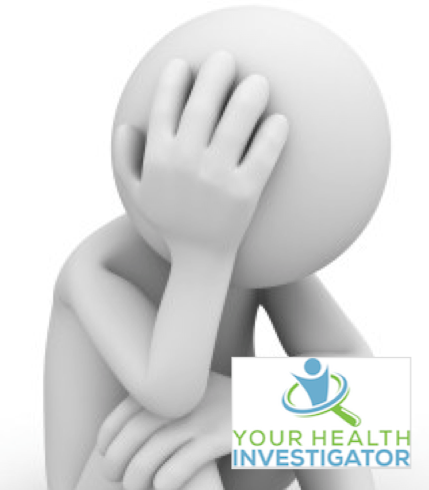Hello everyone, it’s good to have you,
I feel like the subject of depression is something that needs to be talked about…. often.
I believe that all of us know someone suffering from depression and they are being medicated for it.

I have tried to take a complicated subject and make it simple to follow. Do not get intimidated by the length of this article. It is very important that you read and understand it. People are suffering, especially our younger population. Read on.
Depression is a national and global epidemic. Just in the United States alone there are over 12 million people who suffer with depression and that number is rising at an alarming rate. The costs to the American public are enormous and I’m not just speaking of money.
For the first time in decades the life expectancy in the US has dropped.
Most of the cause for the drop is believed to be our younger people from drug use and suicide. Scary.
Arun Hendi, a demographer at Duke University wrote. “The rise in drug abuse and suicide could be due to economic factors causing a feeling of despair.”
I would say it is more general despair than the economics of it. People generally seem to be angry, unhappy and very reactive regarding their emotions. Just watch the news in the evening and it’s hard not to feel despair, it would seem that they are selling despair. I stopped watching the news years ago.
Let’s talk about depression.
You need to be an informed health consumer and most importantly you need a physician who will work with as you, as you systematically uncover the causes of your depression. Simply masking your sickness with medication is not the solution. You must seek out a physician who will take the time to read and listen to the information you bring them.
Don’t ever let anyone intimidate you to stop looking for the causes of your illness.
The following is commentary on a few common causes of depression. If you want to get better and bring happiness and joy back into your life, then you owe it to yourself to be absolutely certain that you have each of the following causes thoroughly checked.
Here is the first area you need to have checked: The Thyroid Gland Function
Depression can be related to Thyroid Function. Look at all the symptoms of Thyroid Dysfunction. (Depression, Unmotivation, Withdraw, Sluggishness, Fatigue, Weight Gain) this is only some as they relate to Depression.
Approximately 10%-15% of patients with depression have a thyroid hormone deficiency. That may not seem like a lot, but if you take the number 12 million above and take 15% out, that is a whopping 1.8 million people. I believe it to be more.
Now I must emphasize to you that the testing of your thyroid MUST include the following:
- Thyroid-stimulating hormone (TSH)
- Free serum thyroxine (fT4)
- Free triiodothyronine (fT3)
- Anti-thyroglobulin antibodies (anti-TG)
- Anti-thyroid peroxidase antibodies (anti-TPO)
It is well documented that the evaluation of (only TSH) is inadequate as a means of testing your thyroid. If you have been told by your physician that your thyroid is fine and have not had the above tests ordered, then think again.. your physician does not have all the facts.
Obtaining a comprehensive thyroid panel is essential to rule the thyroid as a possible cause of depression. The medical literature has discovered a link between low T3 and long-standing depression. The common treatment of hypothyroidism with Synthroid (a T4-only thyroid medication), may be contributing to an increase in depressive symptoms due to it’s inability to address a deficient T3.
A comprehensive thyroid panel will also test the possibility of you suffering from a thyroid auto-immune/depression syndrome. An increasingly common Thyroid Auto-Immune Disease is Hashimoto’s Thyroiditis.
The second area you want looked into is Stress Response.
Depression has also been linked to disruptions in the body’s stress and stress response center – known as the Hypothalamic, Pituitary and Adrenal or (HPA) axis. The HPA axis is a complex communication system between the Hypothalamus (part of the lower brain), the Pituitary gland and the Adrenal glands. The Adrenal glands, when signaled by the H and P, in turn produce hormones for response to our stress.
The hypothalamus is a region of the brain that controls and monitors an immense number of bodily functions including: emotions, behavior, pain and pleasure. These are all in response to our inside and outside environments. It is the connection from the outside world and how we perceive it.
The Hypothalamus and the Pituitary are responsible for causing the adrenal glands to produce the well-known stress hormones called Cortisol and DHEA.
First, when a person experiences some powerful depressing thought, the hypothalamus is sent a signal to wake the pituitary up telling it to produce some of its hormones.
A strong relationship between the overproduction of cortisol and mood variations has been established in both depressed and healthy individuals. As with many of the body’s physiological responses, balance is the key.
Over-activity of the body’s stress response system is associated with anxiety, insomnia, loss of libido, while under-activity is linked to depression with accompanying fatigue, lethargy and indifference.
Depressed individuals often exhibit trouble balancing the normal relationships between the HPA axis.
Can someone, being overly stressed, have depressive symptoms? It is important to know how your (HPA) axis is functioning as well as the stress response. With that information in hand, your physician will be in a better position to outline a patient specific plan.
As the incidence of depression reaches epidemic proportions, I sometimes wonder how one can overlook or may I say ignore the research documenting known causes that can be easily identified and treated.
Another common cause of Depression and Anxiety is the relationship between nutrient deficiencies, chemical toxins and depression.
The medical literature is “over-flowing” with peer-reviewed abstracts proving beyond a shadow of a doubt that depression, nutritional deficiencies and chemical toxicities are linked.
Our body requires optimal amounts of trace minerals such as: magnesium, zinc, selenium and vanadium (to name a few) in order to function well.
For instance, low levels of zinc are associated with resistant depression. Deficiencies of magnesium can bring on a wide range of psychiatric symptoms related to depression and psychosis. Deficient Selenium can cause Low Thyroid symptoms. See above.
Chemical Connection: Invisible Brain Toxins
One of the big problems with chemicals is they have this nasty ability to sneak up on you when you least expect it. Most of the chemical sensitivities sneak up on a person over a period of weeks, months or years slowly damaging your detoxification pathways. It is not unusual for a person to experience a sudden onset of depression or lethargy when a new carpet is installed or a building is renovated or freshly painted.
Here is some basic biochemistry.
In order to detoxify chemical toxins, your body requires adequate amounts of zinc.
Zinc runs the enzyme that is important for detoxifying everyday home and office chemicals. The most common chemical found in carpets, home furnishings, copy machines, secretarial white-out, commercial floor cleaners, polishers, waxes, glues, adhesives and other common household and office surroundings is a chemical called Trichloroethylene.
Read the well known article on ‘Toxic Teacher Syndrome‘ and you can see how a whole spectrum of ‘mysterious’ illnesses can happen.
How does this happen? When you are exposed to a chemical, it is likely that you either inhaled it or absorbed it through your skin. Normally this chemical, like most chemicals, will be neutralized by your body’s detoxification system and then eliminated.
However, if your body’s ability to neutralize chemicals is impaired (a possible zinc deficiency or chemical overburden), the chemical such as, Trichloroethylene will back up and will accumulate in the brain. The person will feel spacey, dizzy, dopey, unable to concentrate, foggy and very depressed.
This is only one chemical linked to depression. There are other environmental toxins linked to depression.
Think about this, a person is on 4 medications because of diabetes, high cholesterol and high blood pressure. A common scenario. Add to this, pesticides sprayed on their food and their lawn as well as drinking water out of plastic bottles. Also, add the fact that they just had carpet installed at work and the ventilation system never worked well. All of these chemicals get processed through the same pathways. Talk about over-burdening the liver and body!
Do you see how there can be a web of causes that must be looked into before medicating someone for depression and anxiety?
By the way, did I tell you how dangerous some of these depression and anxiety medications can be? Commonly prescribed Adderall, is only one molecular group away from being Crystal Meth! Wow!
There is ‘no one’ treatment that will fix all people suffering from depression. Take ten people suffering with depression and it is likely that the cause and the treatment can be different for all ten. With that in mind, it is wise to be certain what may be causing your health problem.
You may indeed be suffering with a zinc deficiency which would interfere with the body’s ability to effectively eliminate chemicals that are off-gassing from your new carpet.
Again, it is imperative to have a physician who understands the potential causes of a disease and for the sake of this report, depression.
The physician MUST conduct a thorough and rather exhaustive investigation/consultation with each patient to determine what direction to go in.
For one patient, a physician may determine that an evaluation of the Thyroid and Cortisol hormone levels would be a good start. For another patient, maybe checking for chemical toxicity and nutrient deficiencies would be the way to go.
No matter what, recommending an anti-depressant drug without this type of medical detective work is simply not good doctoring.
If you think that the cause of your depression is linked to chemical toxicity and/or nutrient deficiencies, then I recommend that you ask a doctor of Functional Medicine to look into your case. Get a free 10 minute consultation.
Again, Depression is a disease which claims new victims everyday. The causes of this mental disease can range from thyroid or cortisol deficiencies to nutrient deficiencies/chemical toxicity exposure.
Remember, my goal is to provide you with education. I am committed to helping you become an informed and well-educated consumer of health care services for your health concerns.
The more you know and the more you understand about your condition, the greater potential of you getting a personalized plan and gaining a new lease on life.
Pass this along to loved ones who may have a family member suffering from this terrible condition.
Cheers and good health, Dr. Bill
